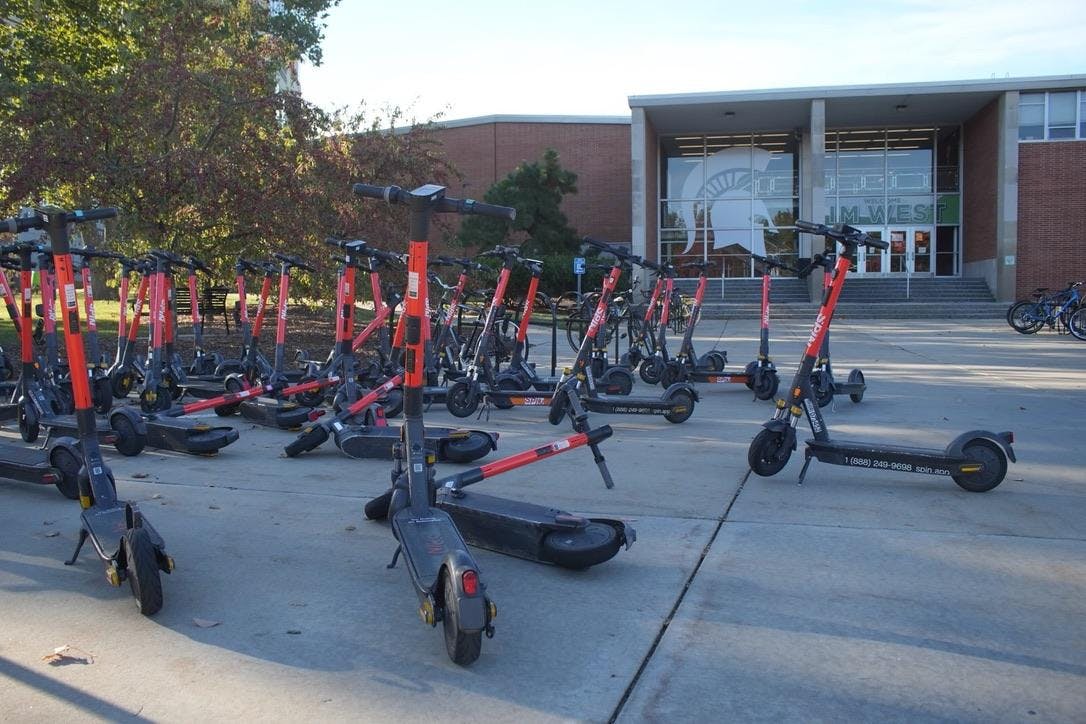After some negative publicity, the scooter company Spin is trying to make their micro-mobility more sustainable. Over 260 scooters were pulled out of the Red Cedar River during cleanups and the company was briefly banned in East Lansing, but now the number of waterlogged scooters has decreased.
"There definitely has been a decline and a lot of that is based on the operational steps that we’ve taken to mitigate the issue," head of government partnerships for Spin central region Jimmy Gilman said. "We have actually geofenced the river or the bridges that cross the river as no park zones so folks can’t even end their trip near the bridges or near the river on campus."
The company has also decreased their service area significantly. Spin scooters can not be used in the areas north of the river on campus. Gilman said he doesn’t believe the riding areas are too limited because Michigan State University’s campus is geographically large.
"We’ve still seen strong ridership, I would say ridership has gone down a small amount but there were times when we’re still seeing very, very strong ridership towards the beginning of the semester and that really has sustained through the month of October as well," Gilman said.
Recently, the company helped sponsor MSU’s most recent river cleanup event. They brought magnet fishers to help the cause.
"We were doing our magnet fishing, helping to pick up anything that might be in the river including scrap metal, bicycles, shopping carts that sometimes end up in the area," Gilman said. "Anything that we pull up, we’ll make sure is recycled properly. We’re not just in it to retrieve scooters. We’re in it to retrieve any object that shouldn’t be in the river."
Gilman said they are open to sponsoring more cleanup events and they consistently donate five cents of each trip made to different initiatives for campus.
"Part of that funding will go towards stewardship of the Red Cedar River Committee activities, including potentially buying them some equipment, contributing with their cleanups and potentially sponsoring some of their lunch and learn activities," Gilman said.
He said they have more staff now to make sure devices are relocated within 30 minutes if they end up near the river. After the employee assesses where the scooter is, it will be either retrieved by hand or magnet fishing.
MSU’s campus area was previously in the 90th percentile for vandalism of the scooters compared to programs across the nation. In 2024, those numbers dropped, and now MSU is in the fifth percentile. Gilman said MSU has been an invaluable partner for spin during the transition.
Gilman said the company is in it for the long-run because access to micro-mobility is important to them. They want to keep presenting a viable solution for the community. He said the company understands even just one scooter in the river is too many, and their goal is to get that number down to zero in every program.
Political theory and constitutional democracy junior Sean Kelly said the scooter vandalization might have been bad at MSU because of the campus environment.
"That reputation, we have that for a reason, of being rowdy, aggressive, people drinking and making poor decisions," Kelly said. "I also truly think it’s because, from how I viewed it, the majority of people that use spin scooters didn’t use them to get to class. They used it like a toy coming back from the bars, from fraternities."
Kelly said he thinks being impaired and then realizing the cost of the scooter might have led to vandalization of them.
"My boyfriend actually did a research study on the spin scooters with the East Lansing Public Transportation Center and spin scooters on the East Lansing campus had a huge problem with being too expensive," he said.
The study, according to Kelly, found that the marginal costs outweighed the marginal benefits for students and he said this could contribute towards negative actions taken against the transportation device. He said there was also a trend where people would post their vandalism.
"People would just post themselves bringing them into their dorm and having it like a decoration," Kelly said.
Kelly thinks MSU could have introduced the scooters better to promote a more positive view of them.
"I think if it was an MSU endorsed transportation service, that would be much more efficient," Kelly said. "For example, no one is vandalizing the CATA buses. It’s still public transportation that you pay for, it’s in your tuition, but no one is vandalizing those other types of transportation."
Biology sophomore Lucy Gowans said she wasn’t on campus when people were posting about the scooters in the river, but she has been told stories.
Support student media!
Please consider donating to The State News and help fund the future of journalism.
"Whatever (Spin is) doing it’s probably working to some extent, but obviously people get around it somehow because I’ve been told about it this year too," Gowans said.
Gowans said both sides are at fault for the vandalization. She thinks the party school atmosphere probably has something to do with the phenomena, but the company needs to be accountable as well.
"It’s their product so they have some responsibility, but also they couldn’t have predicted that people would be throwing their giant electrical scooter into a river," she said. "They can’t just let it keep on happening."
Discussion
Share and discuss “Spin scooter company is attempting to be more sustainable amidst bad reputation” on social media.





